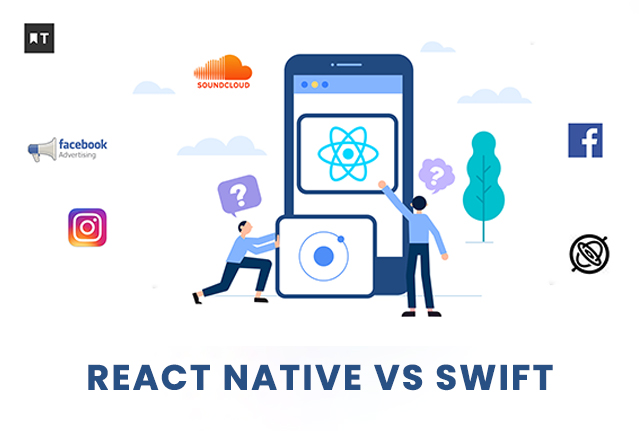

Posted by Padma Ahire on Tue, 20/06/2023

In the rapidly evolving world of mobile app development, choosing the right technology stack is crucial to ensure the success of your ios app is vital. With a plethora of options available, developers often find themselves torn between different frameworks and programming languages. One must carefully choose mobile app development services for their project. Regarding iOS development, two prominent frameworks stand out: React Native and Swift. React Native, a JavaScript-based framework developed by Facebook, and Swift, a programming language introduced by Apple, offer unique advantages and cater to different needs. In this blog post, we will delve into the debate of React Native vs Swift and explore the strengths and weaknesses of each to determine which one is best suited for iOS development. Here we will explore the pros and cons of each option to help you make an informed decision for your iOS app development endeavors.
React Native: An Overview
React Native is a cross-platform framework developed by Facebook for developing mobile apps. It allows developers to build native mobile apps for iOS & Android using a single codebase written in JavaScript. React Native is based on the React library, which is primarily used for building user interfaces for web applications.
The main advantage of React Native is its ability to create apps that look & feel like native applications. It achieves this by using native components & APIs provided by the respective platforms, resulting in high-performance and responsive apps. React Native also offers a hot reload feature, enabling developers to see the changes instantly without the need to recompile the entire app.
React Native: Cross-Platform Brilliance
React Native has gained immense popularity in recent years due to its cross-platform capabilities. It allows developers to build iOS and Android applications using a single codebase, significantly reducing development time and effort. With React Native, you can write code in JavaScript and achieve near-native performance on both platforms.
One of the major advantages of React Native is its vast community support & rich ecosystem of pre-built components and libraries. This allows developers to leverage existing resources, saving time & effort in the development process. Furthermore, the "hot reloading" feature in React Native enables real-time code changes, making the development and debugging process faster and more efficient.
React Native also provides a bridge that allows developers to access native components & APIs. This means that if there are specific iOS features or functionalities that are not readily available in React Native, developers can write custom native modules to bridge the gap. However, this can add complexity to the development process and may require additional time and expertise.
However, despite its numerous advantages, React Native does have a few limitations. Since it uses JavaScript, it may not be the best choice for complex, computationally intensive applications. JavaScript is an interpreted language, which can result in slower performance compared to natively compiled code. Additionally, accessing certain native functionalities & APIs may require writing custom native modules, which can add complexity to the development process.
Swift: An Overview
Swift, on the other hand, is a modern programming language developed by Apple specifically for iOS, macOS, watchOS, and tvOS app development. Introduced in 2014, Swift has rapidly gained popularity among developers due to its safety, speed, and expressiveness. It was specifically designed to work seamlessly with Apple's frameworks & APIs, offering a native and highly optimized experience. With Swift, developers can tap into the full power of Apple's ecosystem, taking advantage of the latest features and technologies. Swift is designed to work seamlessly with Apple's Cocoa and Cocoa Touch frameworks, providing access to a wide range of APIs and libraries for building iOS apps.
Swift: Apple's Native Powerhouse
One of the standout features of Swift is its enhanced performance. Since Swift is a compiled language, it is highly optimized & runs directly on the device's hardware, resulting in fast & efficient code execution. Additionally, Swift offers advanced features like optional, type inference & memory management, which contribute to writing clean, robust, and less error-prone code.
Since Swift is compiled into native code, it offers better speed & efficiency compared to interpreted languages like JavaScript. Moreover, Swift's type-safety and strong syntax help catch errors at compile-time, leading to more stable and reliable code.
Another advantage of Swift is its comprehensive set of libraries and frameworks tailored to Apple's platforms. The UIKit & SwiftUI frameworks provide powerful tools for designing user interfaces, creating animations, and building seamless app experiences. Furthermore, Swift's interoperability with Objective-C allows developers to leverage existing Objective-C codebases and seamlessly integrate new features.
Swift also offers excellent support from Apple and a large community of developers. The official documentation and resources provided by Apple make it easier for developers to learn and adopt Swift for iOS development. Additionally, Apple continuously updates and improves Swift, ensuring that developers have access to the latest advancements in iOS app development.
However, Swift has its limitations too. One of the significant drawbacks is its lack of cross-platform capabilities. If you plan to develop multiple platforms, you'll need to build separate codebases for each, resulting in increased development time and maintenance efforts. Additionally, the learning curve for Swift might be steeper for developers coming from a JavaScript background.
React Native vs Swift: Which is Best for Your App
When deciding between Swift or React Native for iOS mobile app development, it's essential to consider various factors specific to your project's requirements and constraints. Here are a few factors to consider:
App Complexity: If your app requires heavy computational tasks or complex native interactions, Swift may be a better choice due to its superior performance and seamless integration with Apple's frameworks.
Time-to-Market: If speed is a priority and you need to launch your app on multiple platforms simultaneously, React Native's cross-platform capabilities can significantly reduce development time and effort.
Developer Skill Set: Assess the skill set of your development team. If they are proficient in JavaScript, React Native might be the more natural choice. However, if you have experienced Swift developers with a deep understanding of Apple's ecosystem, Swift may be the way to go.
Long-Term Maintenance: Consider the long-term maintenance and scalability of your app. If you anticipate frequent updates and enhancements, React Native's single codebase can simplify the process. However, if you're focused solely on iOS development and anticipate long-term growth on the platform, Swift may provide more control and flexibility.
React Native vs Swift: A Feature Comparison
Now, let's compare React Native and Swift based on various factors to determine their suitability for iOS app development.
Performance: Swift, being a compiled language, offers superior performance compared to React Native, which relies on JavaScript and bridge communication with native components. If your app requires complex animations, heavy computations, or demanding graphical rendering, Swift is the better choice in terms of performance.
Development Speed: React Native has a significant advantage in terms of development speed. Its ability to write code once and deploy it on both iOS and Android platforms saves time and effort. The hot reload feature of React Native also speeds up the development process by permitting developers to see changes instantly. On the other hand, Swift requires separate development for iOS and Android, increasing the development time for cross-platform apps.
Native User Experience: When it comes to providing a native user experience, Swift has the upper hand. Since Swift apps are built using native APIs and frameworks, they seamlessly integrate with the iOS platform, resulting in a polished and consistent user interface. React Native, while striving for native-like performance, may sometimes fall short of delivering a truly native experience due to its reliance on bridging technologies.
Community and Ecosystem: Both React Native and Swift have large and active communities supporting them. React Native benefits from its association with the JavaScript and React communities, which provide a wealth of resources, libraries, and tools. Swift, being an Apple-backed language, has a robust ecosystem with extensive documentation, frameworks, and development tools provided by Apple. The choice between React Native and Swift may depend on the specific requirements of your project and the availability of relevant community resources.
Maintenance and Long-term Support: Swift, being an official programming language for iOS, offers strong long-term support and compatibility with Apple's ecosystem. As Apple continues to evolve its platforms, Swift will likely receive timely updates and improvements. React Native, being an open-source framework relies on community contributions for updates and bug fixes. While the React Native community is active, the long-term maintenance and support may require more effort compared to Swift.
Choosing the Right Option
The decision between React Native and Swift for iOS app development ultimately depends on your specific project requirements, team expertise, and development goals. Here are a few scenarios where each option shines:
Choose React Native if:
You require cross-platform development and want to maximize code sharing between iOS & Android.
Development speed is a top priority, and you want to leverage a vast ecosystem of JavaScript libraries & tools.
Your app focuses more on content delivery and UI flexibility rather than high-performance native interactions.
Choose Swift if:
You prioritize native performance and need to leverage the full potential of iOS devices.
You want to build a feature-rich, highly interactive app that provides a seamless and consistent native user experience.
You have a team of experienced Swift developers or the resources to invest in learning the language.
Conclusion
In the React Native vs Swift debate for iOS app development, there is no one-size-fits-all answer. Both React Native and Swift have their strengths and weaknesses, and the choice depends on the unique requirements of your project, development team, and long-term goals. React Native excels when it comes to cross-platform development and rapid prototyping enabling you to reach a wider audience with a single codebase. Its vast community support and rich ecosystem make it a compelling choice for rapid development and prototyping. However, it may not be the best fit for highly complex or computationally intensive applications.
On the other hand, Swift offers native performance and native user experience, seamless integration with Apple's ecosystem, and a vast array of specialized tools & frameworks. It is an excellent choice for developers who want to leverage the full potential of Apple's platforms & deliver high-performance, feature-rich iOS apps. It's essential to evaluate these factors and make an informed decision to ensure the success of your iOS app.
Consider the complexity of your app, time-to-market constraints, the skills of your development team, and the long-term maintenance and scalability requirements to make an informed decision. In some cases, a hybrid approach that combines React Native and Swift may even be the optimal solution, leveraging the strengths of both frameworks.
Whether you opt for React Native or Swift, partnering with a reliable mobile app development company and skilled mobile app developers will ensure a successful & efficient development process for the success of your iOS app. They can guide you through the decision-making process, help you navigate the complexities of each platform, and deliver a high-quality app that meets your business needs. So, choose wisely, and embark on your iOS app development journey with confidence.